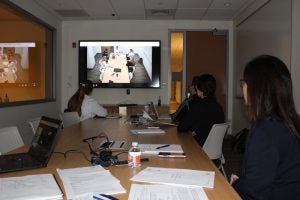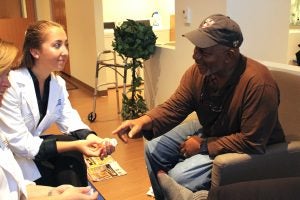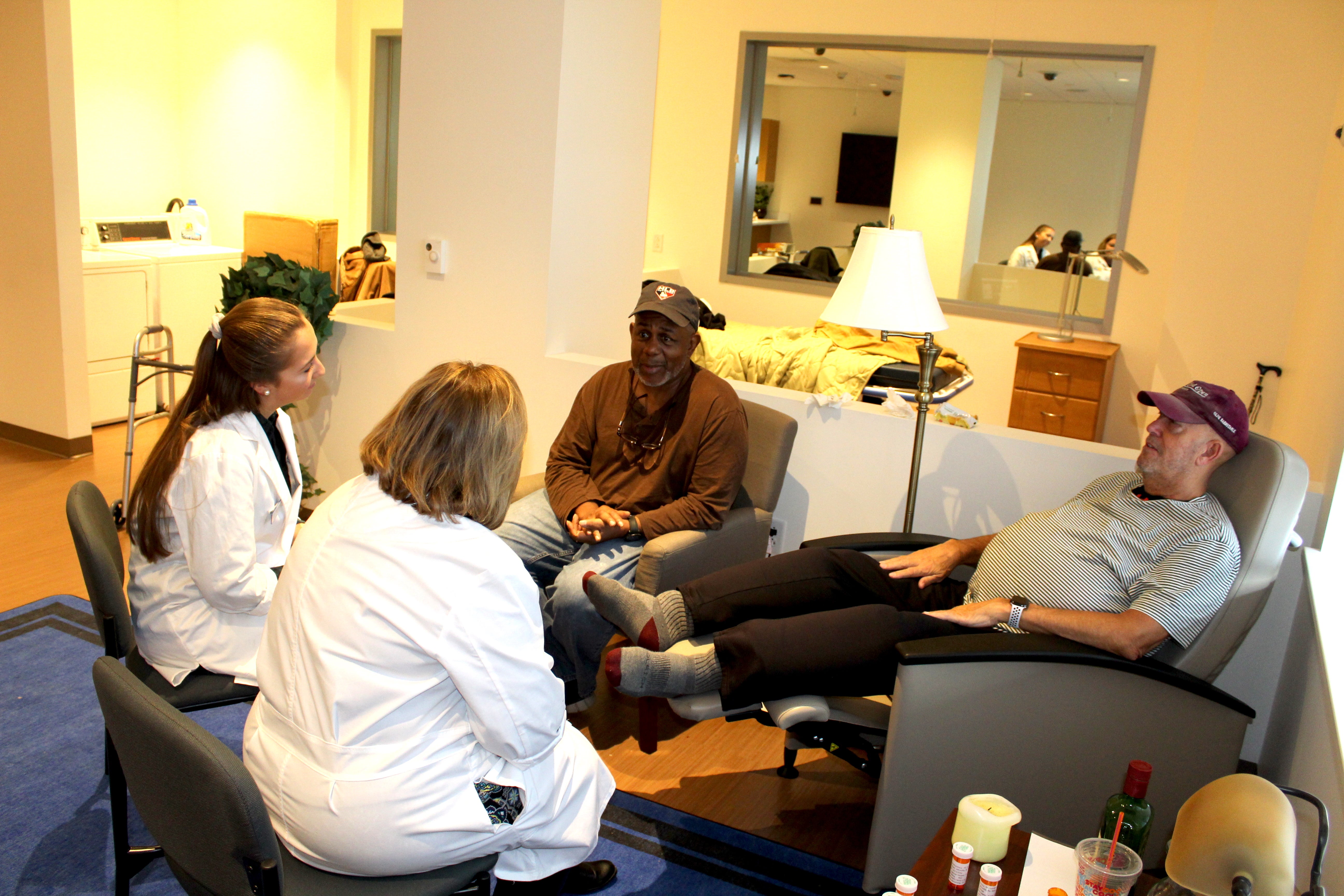Simulations with live actors prepare students for ‘uncomfortable conversations’
Dealing with the approaching end of a patient’s life can be among the most difficult tasks nurse practitioners and other health workers face. An end-of-life conversation can be devastating for the patient and uncomfortable for the care provider, but it is an opportunity to prepare a patient for the inevitable, and give him or her peace of mind that decisions are made and affairs are in order.
How do you discuss the bad news? How do you respond to a patient’s reaction? How do you move forward and focus on the next steps to come in the end-of-life plan? None of these things can be learned in a classroom. They have to be experienced in practice. Students in the URI College of Nursing are getting the chance to prepare for those difficult conversations thanks to classes in end-of-life care and the advanced simulation labs at the Nursing Education Center in Providence.
“So many patients don’t have these discussions with their health care providers,” said URI Nursing Assistant Research Professor Xristin Maestri. “It can be an awkward, uncomfortable conversation. So we give the students a practice scenario to have an end-of-life conversation so when it happens in real life they don’t freeze up, and they’ll know what to say. The patient is driving the boat, but you have to walk beside the patient through all the changes in the disease trajectory.”

The program, funded in part by a $159,000 Healthcare Workforce Transformation grant from the state Executive Office of Health and Human Services, employs Simpl Simulation, a company that specializes in simulated clinical experiences for nursing students. The company spent two days with Maestri recently, running nurse practitioner students through a simulated experience, utilizing live actors in a home-care setting.
The actors portrayed George and Reid, a couple dealing with the recent news that George is nearing the end after being released from the hospital following his latest treatment for liver and heart failure. Three at a time, nursing students entered the simulated home — designed to resemble a typical four-room apartment, complete with living room, bedroom, kitchen and bathroom to create as realistic a scenario as possible — to meet with the couple and discuss George’s end-of-life plan.
The students asked the couple about George’s medication, diet and overall health condition, but also discussed the couple’s home life and economic status before focusing on the crux of the project — George’s wishes for his final days. While the conversations are difficult, they can be empowering both for the patient and the care provider, according to Phoebe Hall, a student in the URI Family Nurse Practitioner program.
“You individualize someone’s plan when you sit down and talk about it,” Hall said. “Programs like this prepare a whole cohort of health care providers to champion these conversations and not just do what society thinks end-of-life care should be. Everyone has their own way they want to go.”
SEE ALSO: URI Nursing student prepare for a future of home-based care
One key tool healthcare workers use to plan and document a patient’s end-of-life wishes is a MOLST form — Medical Orders for Life-Sustaining Therapy. Nurse practitioners work with patients to create the orders, spelling out in detail what they want their final days — whether they want to be resuscitated or put on a respirator; whether a feeding tube should be used, where the patient would be most comfortable, etc. In a homecare setting, the MOLST is stored on the patient’s refrigerator so emergency medical technicians know to take it to the hospital if they encounter an unresponsive patient.

“You find out where he is now and where he wants to be – how does he want his life to end,” student Amanda Barbosa said about having the conversation and creating the MOLST. “Having the actors is great. You can have a real conversation and get feedback on how you can do a better job having a really uncomfortable conversation.”
That is the goal of the unique simulation, according to Denise Coppa, interim dean of the College’s graduate program and principle investigator on the project.
“What makes this unique is that very few are doing this – preparing students to deliver end-of-life care,” Coppa said. “It can be very difficult, especially for a newer nurse practitioner who hasn’t had a lot of experience dealing with the end of a patient’s life. Being prepared and knowing how to have that conversation will be a comfort to the patients and will help the nurse practitioner feel less uncomfortable.”

